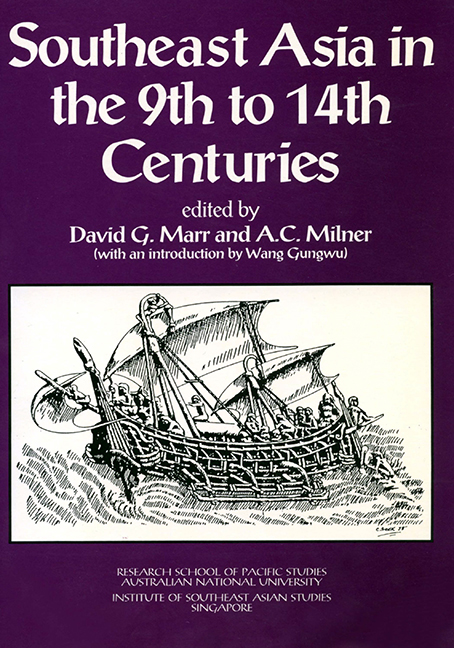Book contents
- Frontmatter
- Contents
- Contributors
- Preface
- Introduction
- 1 The Early and the Imperial Kingdom in Southeast Asian History
- 2 Hydraulic Works and South East Asian Polities
- 3 Some Notes on Relations between Central and Local Government in Ancient Java
- 4 Negara, Mandala, and Despotic State: Images of Early Java
- 5 Some Remarks on Early State Formation in Cambodia
- 6 “Elephants Can Actually Swim”: Contemporary Chinese Views of Late Ly Dai Viet
- 7 Authority and Legitimacy in 11th Century Vietnam
- 8 From Myth to History: Imagined Polities in 14th Century Vietnam
- 9 Shipshape Societies: Boat Symbolism and Political Systems in Insular Southeast Asia
- 10 Changing Perspectives in Island Southeast Asia
- 11 Political and Cultural Continuities at Dvaravati Sites
- 12 The True and the Corbel Arch in Mainland Southeast Asian Monumental Architecture
- 13 Vietnamese Ceramics and Cultural Identity: Evidence from the Ly and Tran Dynasties
- 14 Traditions, Acculturation, Renovation: The Evolutional Pattern of Vietnamese Culture
- 15 Symbolism of Kingship in Arakan
- 16 Buddhism in Champa
- 17 The Ordering of Generations: Change and Continuity in Old Javanese Kinship
- 18 Sources on Economic Activities in Khmer and Cham Lands
- 19 Narrative Bas-Reliefs at Candi Surawana
- 20 Possibilities for a Reading of the 1293-1357 Period in the Vietnamese Annals
- Index
- Miscellaneous Endmatter
6 - “Elephants Can Actually Swim”: Contemporary Chinese Views of Late Ly Dai Viet
Published online by Cambridge University Press: 21 October 2015
- Frontmatter
- Contents
- Contributors
- Preface
- Introduction
- 1 The Early and the Imperial Kingdom in Southeast Asian History
- 2 Hydraulic Works and South East Asian Polities
- 3 Some Notes on Relations between Central and Local Government in Ancient Java
- 4 Negara, Mandala, and Despotic State: Images of Early Java
- 5 Some Remarks on Early State Formation in Cambodia
- 6 “Elephants Can Actually Swim”: Contemporary Chinese Views of Late Ly Dai Viet
- 7 Authority and Legitimacy in 11th Century Vietnam
- 8 From Myth to History: Imagined Polities in 14th Century Vietnam
- 9 Shipshape Societies: Boat Symbolism and Political Systems in Insular Southeast Asia
- 10 Changing Perspectives in Island Southeast Asia
- 11 Political and Cultural Continuities at Dvaravati Sites
- 12 The True and the Corbel Arch in Mainland Southeast Asian Monumental Architecture
- 13 Vietnamese Ceramics and Cultural Identity: Evidence from the Ly and Tran Dynasties
- 14 Traditions, Acculturation, Renovation: The Evolutional Pattern of Vietnamese Culture
- 15 Symbolism of Kingship in Arakan
- 16 Buddhism in Champa
- 17 The Ordering of Generations: Change and Continuity in Old Javanese Kinship
- 18 Sources on Economic Activities in Khmer and Cham Lands
- 19 Narrative Bas-Reliefs at Candi Surawana
- 20 Possibilities for a Reading of the 1293-1357 Period in the Vietnamese Annals
- Index
- Miscellaneous Endmatter
Summary
A major confusion that exists in general writing on Vietnamese history concerns the nature of state and society in the Lý period (1010-1225). The assumption is often made that the millenium of Chinese domination (usually seen as dating from 111 B.C. to A.D. 939) had such a profound effect on the Vietnamese that all aspects of their civilization must be seen in a Chinese light. We would thus expect to find in Vietnam a bureaucratized, Confucian state with a strong central control and a people organized in patrilineal and strongly patriarchal clans. In this same way, we would also expect to see a major “faultline” (in the term used at this conference) existing between Vietnam and the rest of Southeast Asia, a cultural break so complete that the peoples on both sides of the line would have almost nothing in common with each other and be culturally, if not racially, antagonistic.
Yet evidence from both within Vietnam and without may lead the historian who studies Vietnam in the first centuries of its independence to a differing conclusion. By approaching the Vietnamese of the eleventh and twelfth centuries in a manner similar to the study of other parts of Southeast Asia at the same time, the historian can gain a better sense of the relative closeness or distance between Đại Viet and its contemporary Southeast Asian kingdoms. Keith W. Taylor elsewhere in this volume uses Vietnamese sources to look at the eleventh century and the establishment of Lý power; here I use contemporary Chinese sources in combination with Vietnamese materials to take a glance at the late twelfth century and the decline of the Lý.
In addition, the work of O.W. Wolters is of great value to this study in three specific ways. First, his use of Chinese sources for the study of Southeast Asian history demonstrates how such external information may help to provide a pattern for the study of individual Southeast Asian peoples. Second, his study of the nature of early Southeast Asian leadership points the way for our examination of indigenous political events. And, most specifically, his work on the Tran period and its view of the preceding Lý has provided a critical ingredient for the study of the end of the Lý and the beginning of the Tran.
Wolters' major use of Chinese sources is well known.
- Type
- Chapter
- Information
- Southeast Asia in the 9th to 14th Centuries , pp. 117 - 138Publisher: ISEAS–Yusof Ishak InstitutePrint publication year: 1986



